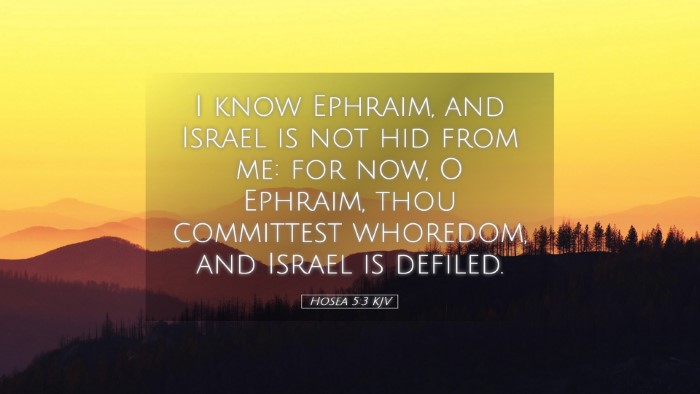Old Testament
Genesis Exodus Leviticus Numbers Deuteronomy Joshua Judges Ruth 1 Samuel 2 Samuel 1 Kings 2 Kings 1 Chronicles 2 Chronicles Ezra Nehemiah Esther Job Psalms Proverbs Ecclesiastes Song of Solomon Isaiah Jeremiah Lamentations Ezekiel Daniel Hosea Joel Amos Obadiah Jonah Micah Nahum Habakkuk Zephaniah Haggai Zechariah MalachiHosea 5:3
Hosea 5:3 KJV
I know Ephraim, and Israel is not hid from me: for now, O Ephraim, thou committest whoredom, and Israel is defiled.
Hosea 5:3 Bible Commentary
Bible Commentary on Hosea 5:3
Bible Verse: "I know Ephraim, and Israel is not hid from me: for now, O Ephraim, thou committest whoredom, and Israel is defiled." (Hosea 5:3)
Introduction
The prophecy contained in Hosea is a profound commentary on the relationship between God and His people, Israel. Hosea 5:3 stands as a critical verse within this prophetic book, revealing God's intimate knowledge of His people, their sins, and the consequences thereof. The verse emphasizes both divine omniscience and human infidelity, highlighting themes of judgment, mercy, and redemption.
Contextual Analysis
The book of Hosea is set against a backdrop of spiritual decay and social injustice in Israel. Hosea served as a prophet in a time of national decline, characterized by idolatry, moral failure, and a departure from covenant loyalty. Ephraim, often a stand-in for the northern kingdom of Israel, represents a people straying from their commitments to Yahweh.
- Historical Context: The verse echoes the turmoil of Israel in the 8th century B.C., a period marked by political instability and invasion.
- Theological Background: The entire book serves as an allegory of God’s relationship with Israel, akin to a marriage where infidelity leads to discord and eventual separation.
Commentator Insights
Matthew Henry
Matthew Henry interprets this verse through the lens of God’s omniscience. He notes that God's knowledge of Ephraim signifies that no sin goes unnoticed. Henry asserts that God’s declaration, “I know Ephraim,” serves both as a warning and admonition. It underscores the idea that despite the people’s attempts to conceal their sins, they remain exposed before God.
Furthermore, he highlights the metaphor of "whoredom," suggesting that Israel's unfaithfulness to God is likened to marital unfaithfulness—a breach of covenant that merits divine judgment.
Albert Barnes
Albert Barnes expands on the idea of knowledge and defilement presented in this verse. He emphasizes the relational aspect of God’s awareness, portraying it not merely as observation but as deep, intimate understanding. Barnes articulates that the term "defiled" reflects a profound spiritual degradation, akin to physical and moral impurity. He observes that this defilement is not merely personal but communal, depicting the collective state of Israel.
Barnes also cautions against the complacency of Israel, urging that the acknowledgment of sin is a precursor to repentance. He encourages a return to righteousness lest the inevitable consequences of sin lead to divine judgment.
Adam Clarke
Adam Clarke offers a nuanced interpretation of the term “whoredom,” suggesting it encapsulates not only idolatry but also various forms of moral corruption prevalent in society. Clarke remarks that Hosea's use of such vivid language underscores the gravity of Israel's transgressions. He expounds on the nature of Ephraim's idolatry, drawing parallels to the fertility cult practices that permeated the ancient Near East, which were abominable in the sight of Yahweh.
Clarke concludes by emphasizing the urgent call to repentance, asserting that recognition of sin is paramount to restoring right relations with God. He regards this verse as a pivotal moment in the divine narrative of Israel, pointing to both the need for immediate rectification and the hope for future restoration.
Theological Implications
This verse invites deep theological reflection on several key themes:
- Divine Omniscience: God’s knowledge of human hearts emphasizes the theme that God sees all things. This awareness should evoke both fear and comfort—the fear of judgment yet the comfort of God’s presence.
- The Nature of Sin: The metaphor of whoredom highlights the severity of spiritual infidelity. Understanding sin in terms of relational breach can deepen our awareness of our standing before God.
- Call to Repentance: The passage serves as a reminder that awareness of sin leads to the possibility of redemption. Pastors and teachers should encourage congregants to acknowledge their sins truthfully, fostering a community of confession and restoration.
- Hope for Restoration: Although the text implies judgment, the context of Hosea also encompasses themes of hope and restoration through repentance. This dual prospect encourages a balance between grace and truth in Christian teaching.
Practical Applications
The implications of Hosea 5:3 extend beyond ancient Israel, speaking profoundly to contemporary believers:
- Self-Examination: This verse calls for personal and communal introspection about the sins that may exist in our lives and churches, prompting believers to seek purity and fidelity to God.
- Preaching Against Idolatry: In a modern context, the challenge is to discern contemporary 'idols'—anything competing for our devotion to God—and to call these out in our preaching and teaching.
- Encouraging Accountability: Foster communities centered on accountability, where believers can confess and pray for one another, seeking restoration in fellowship with God.
- Highlighting the Character of God: Teach the congregation about God's intimate knowledge of us, reinforcing the truth that while He knows our failings, He also desires our return to Him.
Conclusion
Hosea 5:3 eloquently captures the tension between divine knowledge and human disobedience. It serves as a vital reminder of the serious nature of our commitments to God and the ongoing call to fidelity. For pastors, scholars, and students of the Word, this verse is not merely historical; it remains eternally relevant, challenging us to reflect on our own lives and the communities in which we serve.


